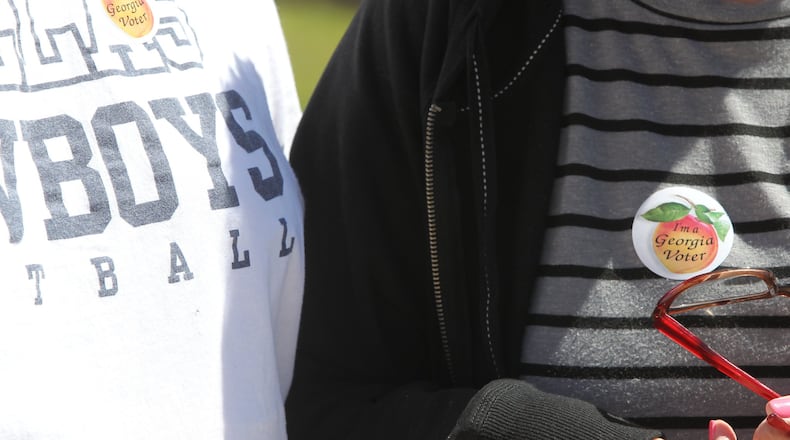Local counties under order to reopen voter registration in Georgia's 6th Congressional District face a backlog of tens of thousands of applications and have already begun working overtime to process them all in time for the June 20 runoff election.
Still, despite concerns that a federal judge’s order would back them into a corner, no problems have been reported so far as the counties themselves appear to have hit the ground running.
“Everything has been going very smoothly,” said Candice Broce, a spokeswoman for Georgia Secretary of State Brian Kemp, the state’s top elections official.
All three counties that have areas in the 6th District — Cobb, DeKalb and Fulton — had contingency plans in place in anticipation of Thursday’s ruling. The first of tens of thousands of backlogged registration applications have already begun to be processed, although officials said it is impossible to know how many of them involve residents in each county who actually reside in the district itself.
That’s because it’s not readily apparent on the applications themselves.
As is the practice statewide to avoid mix-ups and prioritize election work, the counties had temporarily stopped processing the applications on March 20 — the original registration deadline in the April 18 special election to fill former U.S. Rep. Tom Price's seat. The seat came open when Price was confirmed as President Donald Trump's new health and human services secretary.
In the meantime, the counties received hundreds of new or updated registrations applications daily. The volume of those applications has been on the rise since last year, when the state changed how applicants or anyone updating their information through the state Department of Driver Services can ping elections officials to either confirm their status or newly register.
Cobb, for example, had at least 17,000 applications waiting to be processed and had been receiving about 600 a day. According to court records, Cobb Elections Director Janine Eveler said it was not possible to determine from a quick glance of an application whether that voter lived in a particular congressional district.
Furthermore, Eveler said, it was also not possible without fully processing an application to know whether it was from a new voter, a voter who had moved from another county or from a voter who had moved to a different address within the same county.
Therefore, she added, it was best to methodically do them all in the order in which they were submitted — the process that is happening now with the reopening of registration.
Complicating the effort for Cobb and Fulton is that both counties are conducting a separate runoff election next week to fill the state Senate District 32 seat that Judson Hill had held. Hill left the state Senate to run in the 6th District race, but he failed to make next month’s runoff.
Counties expect to hire additional temporary workers or increase hours of ones they already have to help with the workload.
“We have many seasonal workers that we bring in during busy election periods,” Eveler said this week. “We’ll get everything done. Our first priority is to complete the runoff next week for the state Senate race. One election at a time.”
U.S. District Judge Timothy Batten gave 6th District voters until May 21 to register ahead of a June 20 runoff in the nationally watched race between Republican Karen Handel and Democrat Jon Ossoff. His ruling is part of a broader lawsuit filed by five civil rights and voting rights organizations claiming Georgia law cuts off voter registration for federal runoff elections two months too soon as allowed under federal law. The suit is ongoing.
Counties are trying to get all applications in by June 8. That is not a hard deadline, but it is when state officials were expecting to pull the information to compile electronic lists used at polling locations on Election Day to check in voters. All eligible voters who meet the May 21 deadline will be able to cast a ballot June 20.
In DeKalb, the county’s elections director, Maxine Daniels, had people working over the weekend to begin making a dent into a registration backlog of more than 10,000 applications, she said.
The county already had six part-time temporary workers helping with its elections workload. Daniels expects to give all six of those workers extra hours, boosting them close to full time. If necessary, the county also has contracts with temp agencies that it can use to bring additional workers into the fold.
“We’re gearing up,” Daniels said. “We anticipated it coming. We feel like we have it handled.”
About the Author
Keep Reading
The Latest
Featured




